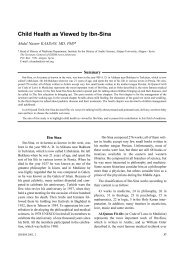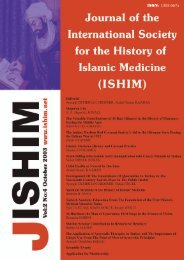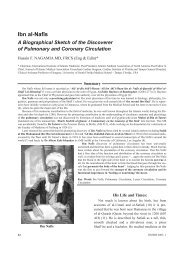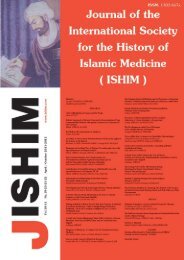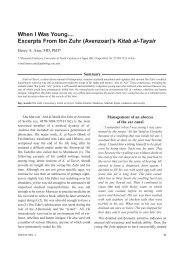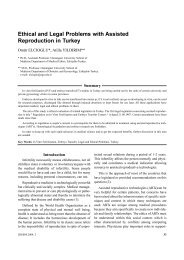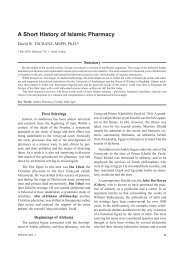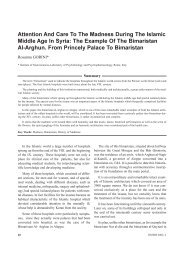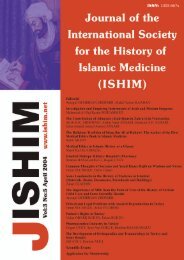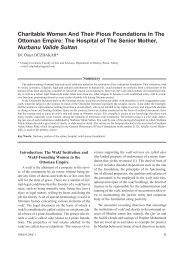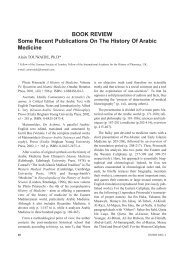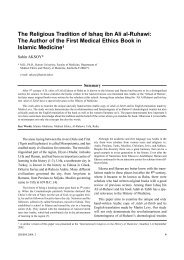Journal - International Society for the History of Islamic Medicine
Journal - International Society for the History of Islamic Medicine
Journal - International Society for the History of Islamic Medicine
You also want an ePaper? Increase the reach of your titles
YUMPU automatically turns print PDFs into web optimized ePapers that Google loves.
A MEDICAL ETHICS PERSPECTIVE TO LAWS IN<br />
PUBLIC HEALTH IN TURKEY<br />
stigmatize <strong>the</strong>m. We know that <strong>the</strong> isolation and<br />
quarantine restrict freedom. Individuals, families,<br />
even entire communities may be identified and stigmatized,<br />
isolated, or quarantine and shunned by <strong>the</strong>ir<br />
neighbors.<br />
Identifying and isolating cases is an accepted feature<br />
<strong>of</strong> communicable disease control, held to be necessary<br />
to protect <strong>the</strong> population. The need to protect<br />
society has been recognized as a higher imperative<br />
than <strong>the</strong> rights <strong>of</strong> an individual patient or contact.<br />
When smallpox, cholera, polio, typhoid, diph<strong>the</strong>ria<br />
and o<strong>the</strong>r contagious diseases were prevalent, few<br />
people questioned <strong>the</strong> actions <strong>of</strong> public health authorities<br />
who notified and isolated patients and quarantined<br />
contacts, <strong>of</strong>ten severely infringing <strong>the</strong> freedom<br />
and dignity <strong>of</strong> entire families.<br />
According to 52-102. articles <strong>of</strong> <strong>the</strong> Turkish Law<br />
<strong>of</strong> Protection <strong>of</strong> Health, immunization campaigns<br />
are compulsory <strong>for</strong> necessary persons. Here, public<br />
health doctor should explain this condition to identifying<br />
persons as empathic. So, <strong>the</strong> beneficence <strong>of</strong> <strong>the</strong><br />
society is very important in Turkey. Moreover, one<br />
duty <strong>of</strong> all who conduct immunization campaigns is<br />
to ensure that everybody is aware <strong>of</strong> <strong>the</strong> risks as well<br />
as having <strong>the</strong> benefits clearly explained to <strong>the</strong>m; in<br />
short, in<strong>for</strong>med consent is essential. This is very<br />
important when children are not admitted to school<br />
without evidence <strong>of</strong> immunization; that is, when<br />
immunization is mandatory ra<strong>the</strong>r than voluntary.<br />
Today, in Turkey, risk-benefit calculations are<br />
required <strong>for</strong> all <strong>for</strong>ms <strong>of</strong> mass medication. The possibility<br />
<strong>of</strong> adverse effects or idiosyncratic reaction<br />
always exists. Opposition to fluoridation <strong>of</strong> drinking<br />
water is based in part on <strong>the</strong> unfounded fear that fluoride<br />
can cause cancer or some o<strong>the</strong>r dread disease.<br />
Epidemiologic analysis shows no association<br />
between fluoridation and cancer. Opposition to fluoridation<br />
is more a political than a public health issue,<br />
in which <strong>the</strong> catch-phrase <strong>of</strong> <strong>the</strong> antifluoridation<br />
movement, “keep <strong>the</strong> water pure”, is difficult to<br />
rebut. Ano<strong>the</strong>r political argument is that fluoridation<br />
is a paternalistic measure, imposed on <strong>the</strong> population<br />
whe<strong>the</strong>r <strong>the</strong>y like it or not. According to <strong>the</strong> ethical<br />
principle <strong>of</strong> respect <strong>for</strong> autonomy, individuals in a<br />
free society should have <strong>the</strong> right to choose <strong>for</strong> <strong>the</strong>mselves<br />
whe<strong>the</strong>r <strong>the</strong>y want to drink fluoridated water.<br />
JISHIM 2004, 3<br />
Ayþegül DEMÝRHAN ERDEMÝR<br />
Responsible adults can choose, but <strong>for</strong> infants and<br />
small children, fluoridated drink water makes <strong>the</strong> difference<br />
between healthy and carious teeth. Applying<br />
<strong>the</strong> ethical principle <strong>of</strong> beneficence, public health<br />
<strong>of</strong>ficials argue that infants and small children should<br />
receive fluoride to ensure that <strong>the</strong>ir dental enamel can<br />
resist cariogenic bacteria.<br />
Proponents <strong>of</strong> computerized medical record storage<br />
and retrieval systems assert that computerize<br />
records are more secure than paper records, but if<br />
unauthorized access does occur, many people’s privacy,<br />
not just one person’s, can be violated. Moreover,<br />
computers can “crash” and a whole library <strong>of</strong> records<br />
may be lost or become inaccessible (4,5).<br />
Applying <strong>the</strong> principle <strong>of</strong> beneficence, it is desirable<br />
not only to maintain data files <strong>of</strong> health-related<br />
in<strong>for</strong>mation, but to expand <strong>the</strong>m; available ideas as<br />
well as available in<strong>for</strong>mation should be used <strong>for</strong> <strong>the</strong><br />
common good. Statistical analysis <strong>of</strong> health-related<br />
in<strong>for</strong>mation has been so convincingly demonstrated<br />
to be in <strong>the</strong> public interest that <strong>the</strong>re is no rational<br />
argument against continuing on our present course<br />
and fur<strong>the</strong>r expanding <strong>the</strong> scope <strong>of</strong> <strong>the</strong>se activities.<br />
This argument applies with particular <strong>for</strong>ce to <strong>the</strong> use<br />
<strong>of</strong> linked medical records, potentially <strong>the</strong> most powerful<br />
method <strong>of</strong> studying diseases that are rare or<br />
have long incubation times, or both (6,7,8).<br />
Health workers have an ethical duty to protect <strong>the</strong><br />
confidentiality <strong>of</strong> <strong>the</strong> records that <strong>the</strong>y use.<br />
Irresponsible disclosure <strong>of</strong> confidential details that<br />
can harm individuals is not only unethical but can<br />
arouse public opinion against collection and use <strong>of</strong><br />
such material. Properly used, health statistics and <strong>the</strong><br />
records from which <strong>the</strong>y are derived do not invade<br />
individual privacy (9,10,11). According to <strong>the</strong><br />
Turkish Law <strong>of</strong> Patients’ Rights with <strong>the</strong> date <strong>of</strong><br />
1998, <strong>the</strong> patient has <strong>the</strong> right <strong>of</strong> privacy (12).<br />
The process and procedures <strong>for</strong> obtaining<br />
in<strong>for</strong>med consent should be clearly understood by all<br />
health workers. The process consists <strong>of</strong> transfer <strong>of</strong><br />
in<strong>for</strong>mation and understanding <strong>of</strong> its significance to<br />
subjects <strong>of</strong> medical interventions, followed by<br />
explicit consent <strong>of</strong> <strong>the</strong> subjects (or responsible proxies)<br />
to take part in <strong>the</strong> intervention (13). According to<br />
<strong>the</strong> Turkish Law <strong>of</strong> Patients’ Rights, <strong>the</strong> in<strong>for</strong>med<br />
35



